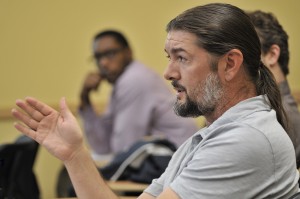NASA Supports Greenwood’s Research on the Moon’s Water

Assistant Professor of Earth and Environmental Sciences James “Jim” Greenwood has received a $331,000 grant from NASA to support his research on the moon’s water.
His proposed research, tracking water in rock samples brought back by the Apollo missions, will “take a giant leap towards solving one of the most important questions in planetary science – whether the Moon is wet or dry,” Greenwood said.
“We’ll be studying pockets of glass trapped in early and late-crystallizing minerals in lunar mare basalt samples,” Greenwood said. “We will measure water and other volatile elements in these trapped melt pockets to reconstruct the volatile history of the samples as they cooled and crystallized near the lunar surface.”
The NASA grant is part of NASA’s Lunar Advanced Science and Exploration Research program.
Greenwood intends to use the grant, which will be distributed over four fiscal years, to fund one Wesleyan undergraduate per summer to conduct research in his lab. The grant will also allow Greenwood to do critical measurement work at Hokkaido University in Sapporo, Japan.
This project is only the latest initiative in Greenwood’s intensive work on lunar rocks, and the Moon’s relative wetness. Most recently he and four colleagues co-authored a paper in the prestigious journal Science, casting doubt on the theory of abundant lunar water, while simultaneously boosting theories around the Moon’s creation, several billion years ago.

